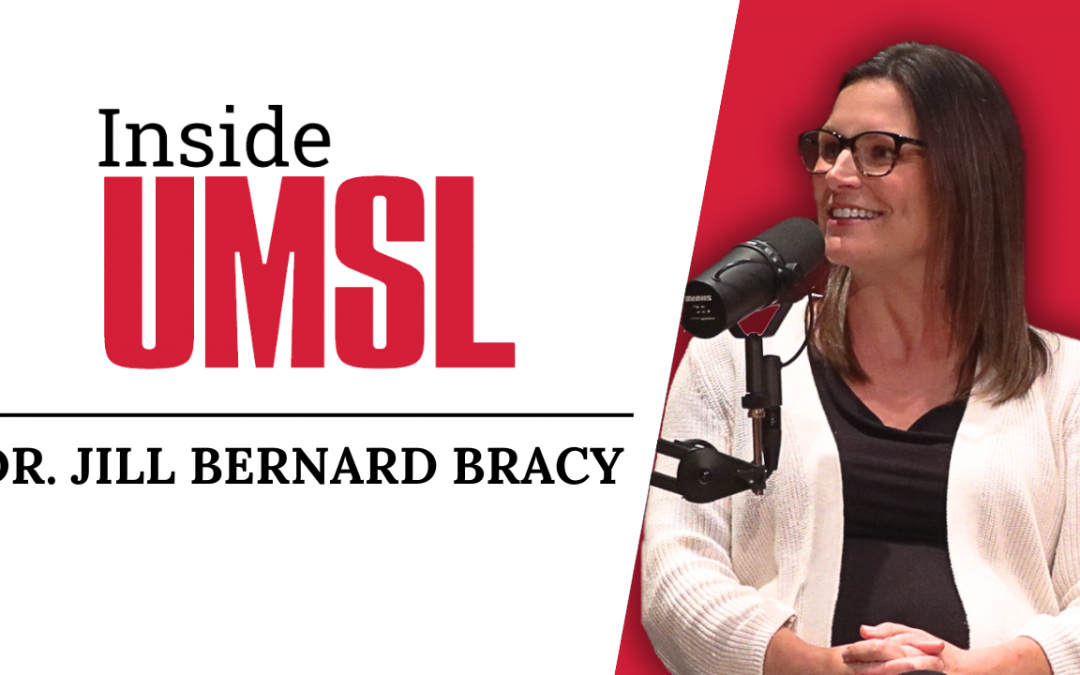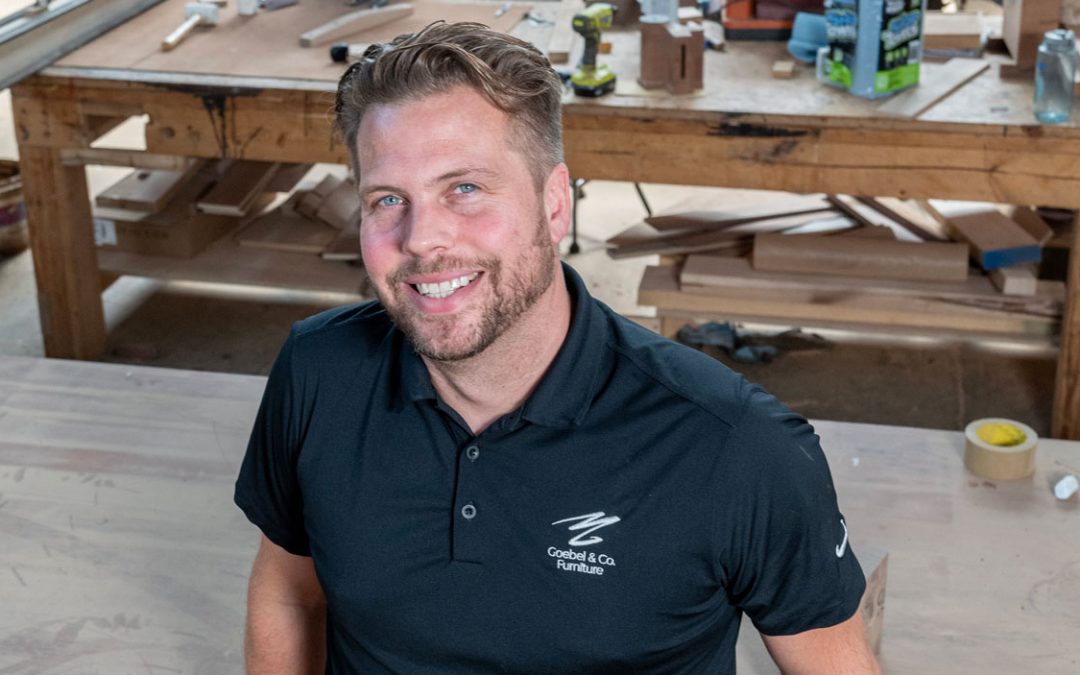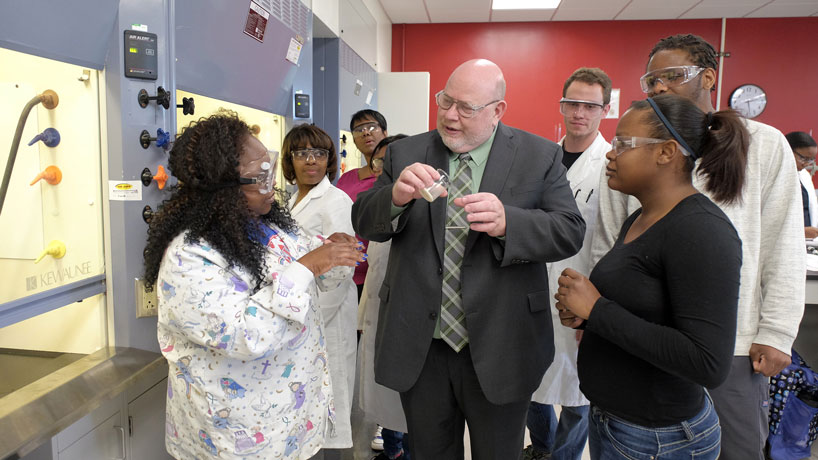
UMSL chemistry alumnus Joe Wilson (center) teaches St. Louis Community College students how to extract peanut oil from peanuts in a chemistry lab he teaches at the Forest Park campus. The professor had an unusual journey through academia, including detours into technology and operating in the lab with limited sight. (Photo by August Jennewein)
Joe Wilson hasn’t had the typical academic career. He started pursuing his doctorate in chemistry at the University of Missouri–St. Louis in 1994. He didn’t finish until 2014.
“It was a 20-year mission,” said Wilson, who has his undergraduate degrees in chemistry and psychology from Southern Illinois University Edwardsville. “The problem was that during the mid-’90s, computer technology really caught fire, and I was swept up in that.”
He had already completed all the coursework for his PhD in chemistry when he left UMSL in 1998, including the eight cumulative examines required to move on to research and dissertation. But Wilson set his doctoral studies aside for more than 10 years to pursue technology gigs, eventually becoming a coordinator and professor of technology at Lewis and Clark Community College in Godfrey, Illinois.
“Looking back, it was silly to walk away from it at that point,” he said. “And the entire time I was in technology, I really just wanted to go back to chemistry.”
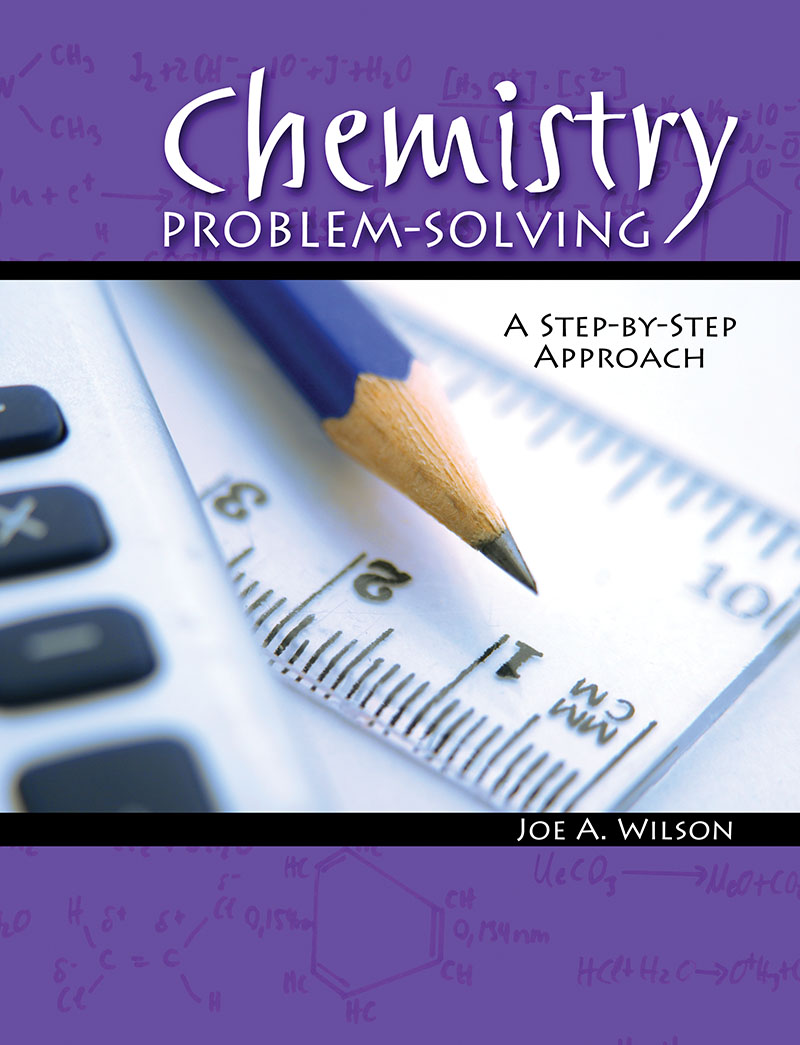
Joe Wilson has been teaching chemistry since the ’90s as a graduate student at UMSL and wanted to write “Chemistry Problem-Solving: A Step-By-Step Approach” since those days. In the interview for this article he said, “I thought ‘There’s got to be a way to explain chemistry to students systematically,'” hearkening back to his tech days of logical flow charts. (Image courtesy of Kendall Hunt Publishing Company)
So he did. Not only did Wilson change up his career and accept a job as a chemistry professor at St. Louis Community College–Forest Park in 2010, but he also rang up UMSL’s Department of Chemistry and Biochemistry the next year hoping to complete that chemistry PhD.
“You know I was afraid to even ask, honestly,” Wilson said. “It was one of those humiliating things that I had left the program all the way back in 1998, and now it’s 2011.”
He found a department that wholeheartedly welcomed him back and a mentor more accepting than he ever expected.
“The chemistry department at UMSL is absolutely wonderful,” Wilson said. “And Dr. [James] Chickos is one of the most amazing people that I have ever met. Nothing seems to rattle him really, and he knows how to adapt and make things happen.”
Wilson started research with Chickos on correlation gas chromatography, examining the thermodynamic properties of fatty acids. Being a full-time professor at STLCC–Forest Park meant Wilson had to complete his research and dissertation in the evenings and on weekends, but little by little he did it and graduated in 2014.
The doctorate is something especially important for Wilson, not just because of his passion for chemistry, but because it also proves he could do something people had once doubted him possible of.
“I have congenital cataracts,” said Wilson, who is borderline legally blind. “There was a concern among faculty when I was an undergraduate student at SIUE that I possibly couldn’t do chemistry labs because I had to hold things too close to see. That’s absolutely not the case, and now I have a PhD to show it.”
The hereditary condition makes it difficult for Wilson to see details beyond four inches away, but he can see colors very well.
“Honestly, people who have had something and lost it, have a much worse time,” he said. “When you’ve never really had it, you don’t know what you’re missing. And in a way you could consider it an advantage because by not seeing all the detail around you, it allows you to focus in on what people are saying.”
Wilson continues to shake up academic traditions in his teaching style at STLCC–Forest Park, too.
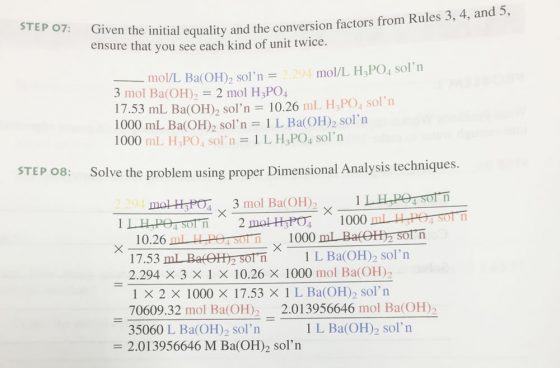
Wilson’s “Chemistry Problem-Solving: A Step-by-Step Approach” features color-coded chemistry problems to help make them a bit clearer. “I remember looking at my notes all just in pencil,” Wilson said, “and you look at it hours later and don’t remember why you did something. You ask, ‘Where did that come from? Why did I do this?’ Color-coding helps immensely.” Wilson has his students take notes in colored pencils to help avoid this. (Photo by Marisol Ramirez)
“The way I do it is very interactive,” he said. “If students have questions, they just ask. Interrupt me. It’s not rude. Ask me. This is more like facilitating, you could say, rather than lecturing. So we have a great time. I work off of the energy they have and give it back.”
Even during this interview, Wilson entertained students who popped in to ask about iodide in comparison to iodine and how their differences affect solving certain chemistry problems. While his doctorate degree opens up the possibility to teach and conduct research at four-year universities, Wilson chooses to stay at STLCC–Forest Park, where he feels students need him.
“Far and away, this is the best group of students you could ask for,” Wilson said. “These students at this campus of STLCC are grateful to be here. They want to learn. They don’t take this for granted. They’re not acting entitled to it. Many of them are first generation. It makes it really nice on my end that they want to be here and that they want what I have to give them. There’s no greater reward. The whole reason to be a teacher is to see people thrive in that knowledge.”
He has a history of sending those students on to undergraduate degrees at UMSL as well.
For his encouraging, positive and interactive approach, Wilson has won a handful of awards in the past few years. He was the Innovator of the Year and a Teacher of the Year finalist for STLCC–Forest Park’s 2014 campus awards. In 2015 he got that Teacher of the Year Award as well as regional recognition for being an Emerson Electric Excellence in Teaching Award recipient. Wilson followed that up with two other awards this year – the Missouri Community College Association’s Excellence in Teaching Award and the League for Innovation’s John and Suanne Roueche Excellence Award.
Although it’s quite the list, the awards aren’t the end goal for Wilson.
“It’s nice, don’t get me wrong. But you don’t do this for the awards. You do it for the students.”













